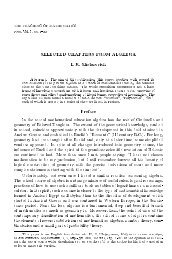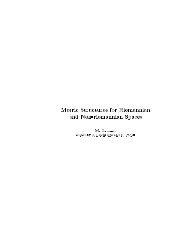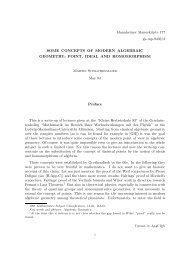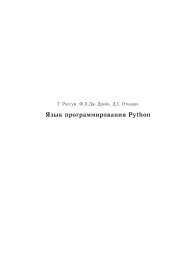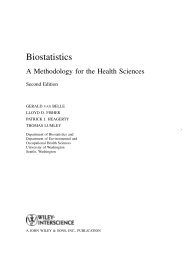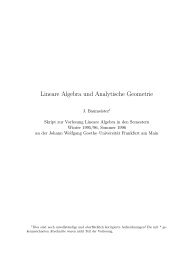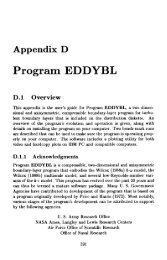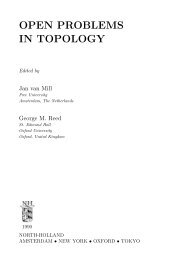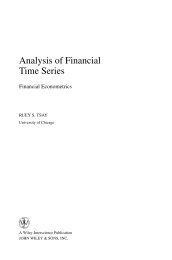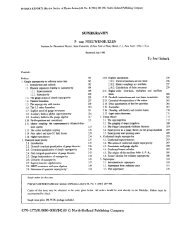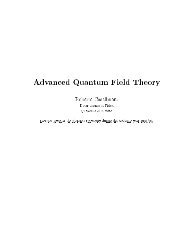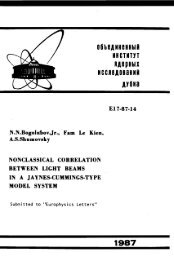Frommer's Las Vegas 2004
Frommer's Las Vegas 2004
Frommer's Las Vegas 2004
Create successful ePaper yourself
Turn your PDF publications into a flip-book with our unique Google optimized e-Paper software.
206<br />
CHAPTER 8 . ABOUT CASINO GAMBLING<br />
The reasoning of the mathematician is quite correct, that of the gambler<br />
is quite wrong (in either one of his scenarios), but just as long as that isn’t a<br />
double-tailed coin. The point of view taken by the magician is highly specialized,<br />
but human nature being what it is, that view is probably the correct one.<br />
In professional gambling centers such as <strong>Las</strong> <strong>Vegas</strong>, great care is taken to<br />
ensure that there are no two-tailed quarters or other purposeful anomalies that<br />
enable cheating to take place. The casinos make their percentages on the builtin<br />
mathematical advantage, which is clearly stated and available to any who ask,<br />
and though that is a very tiny “edge,” it’s enough to pay for the razzle-dazzle that<br />
lures in the customers. It’s volume that supports the business. The scrutiny that<br />
is applied to each and every procedure in <strong>Vegas</strong> is evident everywhere.<br />
So, Fallacy Number One is: Cheating of some sort is necessary for an operation<br />
to prosper. It isn’t.<br />
Fallacy Number Two: Some people just have “hunches” and “visions” that<br />
enable them to win at the slots and tables. Sorry folks, it just ain’t so. The science<br />
of parapsychology, which has studied such claims for many decades now,<br />
has never come up with evidence that any form of clairvoyance (“clear-seeing,”<br />
the supposed ability to know hidden data, such as the next card to come up in<br />
a deal or the next face on the dice) or telepathy (“mind reading”) actually exists.<br />
It’s remarkably easy for us to imagine that we have a hot streak going, or that the<br />
cards are falling our way, but the inexorable laws of chance prevail and always will.<br />
Fallacy Number Three: There are folks who can give us systems for winning.<br />
Now, judicious bet placing is possible, and there are mathematical methods of<br />
minimizing losses, it’s true. But the investment and base capital needed to follow<br />
through with these methods makes them a rather poor investment. The<br />
return percentage can be earned much more easily by almost any other form of<br />
endeavor, at less risk and less expenditure of boring hours following complicated<br />
charts and equations. The best observation we can make on the “systems” is: Why<br />
would the inventors of the “systems” sell something that they themselves could<br />
use to get rich, which is what they say you can do with it? Think about that!<br />
Of course, the simplest of all the systems is bet doubling. It sounds great in<br />
theory, but an hour spent tossing coins in your hotel room, or at the gaming<br />
tables, will convince you that theory and practice are quite different matters. Bet<br />
doubling, as applied to heads or tails (on a fair coin!), consists of placing a unit<br />
bet on the first coin toss, then pocketing the proceeds if you win, but doubling<br />
your bet on the next toss if you lose. If you get a lose, lose, win sequence, that<br />
means you will have lost three units (one plus two) and won four. You’re up one<br />
unit. You start again. If you get a lose, lose, lose, win sequence, you’ve put out<br />
15 units and brought in 16. Again, you’re only up one unit. And no matter how<br />
long your sequences go, you’ll always be up only one unit at the end of a<br />
sequence. It requires you to make that “unit” somewhat sizable if you want to<br />
have any significant winnings at all, and that may mean going bankrupt by simply<br />
running out of capital before a sequence ends—and if you hang on, you’ll<br />
only have been able to end up one unit ahead, in any case. Not a good investment<br />
at all.<br />
Fallacy Number Four: Studying the results of the roulette wheels will provide<br />
the bettor with useful data. We’re peculiar animals in that we constantly<br />
search for meaning in all sets of observations. That’s how subjects of Rorschach<br />
tests find weird faces, figures, and creatures in inkblots that are actually random<br />
patterns with single symmetry. Similarly, any sets of roulette results are, essentially,<br />
random numbers; there are no patterns to be found there that can give



